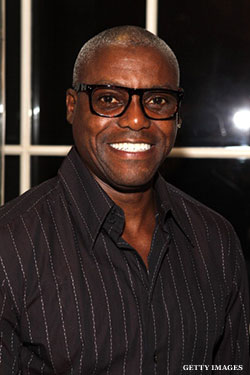
Shortly before Carl Lewis officially entered the 2011 state Senate election for New Jersey's 8th legislative district -- a Republican stronghold located in Philadelphia's outer suburbs -- Gov. Chris Christie caught wind of the decision.
The Republican governor of New Jersey then called Lewis, a Democrat and nine-time gold-medal-winning Olympian, in April of 2011.
"I'm going to come after you," said Christie, according to Lewis.
The Christie administration said that a phone conversation took place but has denied that the governor tried to dissuade Lewis from running.
But that alleged intimidation attempt from a powerful politician to one of the all-time greatest athletic competitors not only adds potential intrigue, it also speaks to the aggressive nature of legislation in the Garden State.
“New Jersey politics is a full-contact sport,” said Ben Dworkin, political science professor at Rider University in Lawrenceville Township, New Jersey.
And perhaps what Lewis perceived to be Christie's combative actions in 2011 were emblematic, foreshadowing the governor’s current crisis. Recent emails have indicated that Christie's office may have engaged in a devious act of political retribution against the Democratic mayor of Fort Lee, N.J.
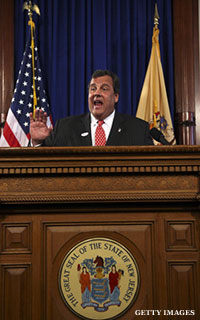
Mark Sokolich endorsed Christie's opponent in the 2013 gubernatorial campaign. Subsequently, lanes of the George Washington Bridge were closed this past September, creating debilitating traffic jams.
"What we're seeing here is part of a pattern that I witnessed personally," Lewis said. "I kind of look at a lot of parallels."
During late April of 2011, Christie's frequent stand-in, Republican Lt. Gov. and secretary of state Kim Guadagno, threw Lewis, who grew up in Willingboro, N.J., off the ballot because he did not meet the four-year residency requirement of the state's constitution. Successive appeals by Lewis failed to get him reinstated, clearing the way for the Republican incumbent state Senator, Dawn Marie Addiego, who won unopposed.
Because of his firsthand experience clashing with New Jersey Republicans, Lewis can offer an informed opinion of Christie’s role in the current scandal and his personality.
"It's hard to believe he didn't know what was going on," he said. "He's not a bully. I think it comes down to insecurity."
The way that Christie and Lewis ended up as political foes carries a dose of irony.
In May of 2010 when Christie inducted Lewis -- along with others, including Judy Blume, Danny DeVito, Jack Nicholson and Susan Sarandon -- into the New Jersey Hall of Fame at the New Jersey Performing Arts Center in Newark, he shook the former Olympian’s hand and said, "Once New Jersey, always New Jersey."
Considering what would transpire, Lewis remains amused by that interaction, giving his own interpretation: "Once you're from New Jersey, you're always from New Jersey,” Lewis joked, "unless you’re running against one of my friends.”
Despite butting heads later on, when Lewis and Christie first met at that Hall of Fame induction, they struck up a cordial relationship. It eventually led to serious discussions about a plan where they would consolidate the physical education programs of New Jersey schools, and the former Olympian would help run it.
Once Lewis entered the state Senate race, those plans were squashed. Eventually so was Lewis' candidacy.
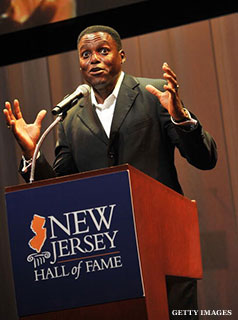
"Mr. Lewis was disqualified -- by every court, state and federal, which he petitioned,” said Michael Drewniak, Christie's press secretary via email to ThePostGame.
The courts said that the track star failed to meet the four-year state residency requirement because he did not pay taxes in New Jersey and voted in California in 2009, even though he grew up in Willingboro before attending the University of Houston. In 2011 Lewis had a foundation in New Jersey, owned homes in Medford and Mount Laurel, volunteered as a Willingboro High track coach and held a valid New Jersey driver's license.
With Lewis' multiple ventures, he had, among other undertakings, an assistant based in Los Angeles and management in Denver. Having offices spanning the nation is common for sports and entertainment celebrities, but Lewis said it was difficult to explain to someone outside those industries.
He even applauded the state's Republicans for finding a way to force him out of the race.
"It was kind of a loophole that they were able to use in order to get what they wanted," Lewis said. "I'm not mad at them for that because that was clever."
The rule itself is a bit inscrutable.
"This was a real question originally about how you define 'resident,'" Dworkin said. "Is that even constitutional to make this kind of requirement?"
If what Lewis maintains -- that Christie's administration creatively used the residency requirement to oust him from the race -- is true, why would Christie go to such efforts in a contest that Addiego likely would have won anyway?
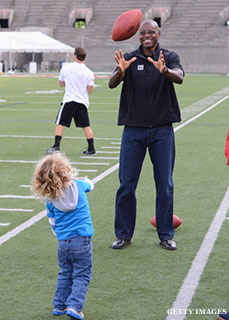
Perhaps, as Dworkin hypothesized, it was because Lewis’ star presence threatened to turn a safe Republican seat into a contested one.
Lewis insists Christie was trying to preserve Addiego's chances and the Republican Party.
"He came to the aid of his friend," Lewis said. "They knew that they were going to lose the whole race, and we had a shot to change the whole county because of that Democrat-Republican number. We had a chance to energize the Democratic Party ... It was all politics."
When contacted by ThePostGame, the Christie administration cast aside Lewis' assertions involving the 2011 state Senate race.
"Mr. Lewis was a genuinely impressive human being and Olympic athlete," Drewniak wrote. "We have nothing but good things to say about his contributions. Unfortunately, this is obviously a sour grapes rehash of a clear-cut legal issue which did not fall his way."
Rather than continue to dispute the ruling, Lewis dropped out of the race in September of 2011.
"I decided in the end to stop going back to court," he said, “because here I was fighting, trying to run a campaign, running my business life, running my life foundation and then in courts all the time. It was just too much.”
Though he remains a "political junkie,” Lewis, 52, now spends most of his time in Houston where he serves a volunteer coach for the Houston Cougars track team. He also owns a marketing and branding company called Carl Lewis Entertainment, serves as a United Nations ambassador for food services, makes speaking engagements and appearances, sits on the board of Best Buddies International, helps run the Carl Lewis Foundation and has Nike and Hershey's sponsorships.
For Christie the years since the 2011 election have witnessed an increased national focus but also political turbulence.
Hoboken, New Jersey, mayor Dawn Zimmer recently claimed his administration withheld millions of dollars of Hurricane Sandy recovery grants because she refused to approve a redevelopment project.
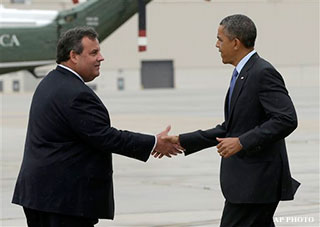
Federal officials are looking into whether Christie improperly used millions of dollars of Sandy relief funds to produce tourism ads promoting the Jersey Shore’s recovery that starred him and his family, giving him added attention during an election year.
“Every kind of political scandal looks stupid after the fact,” Dworkin said. "They all look dumb. And yet they happen."
And, of course, the most potentially stupefying -- and perhaps politically damaging -- involves the traffic jam, which crippled Fort Lee and even delayed emergency response services.
On Sept. 9, medical workers took seven minutes to respond to a 9-1-1 call for Florence Genova, a 91-year-old who had lost consciousness. The heavy traffic forced the paramedics to meet the ambulance on the way to the hospital. Genova went into cardiac arrest before being pronounced dead. The political backlash against Christie might have intensified, but Genova's family didn't blame the gridlock.
The congested streets also wreaked havoc on police, who were searching for a missing 4-year-old girl, though she was eventually found unharmed.
If an investigation reveals Christie's involvement in the Washington Bridge scandal, it could jeopardize his status as one of the country’s most powerful governors and a prominent 2016 presidential candidate.
"I may be the last one standing," Lewis said.
-- Follow Jeff Fedotin on Twitter @JFedotin.




